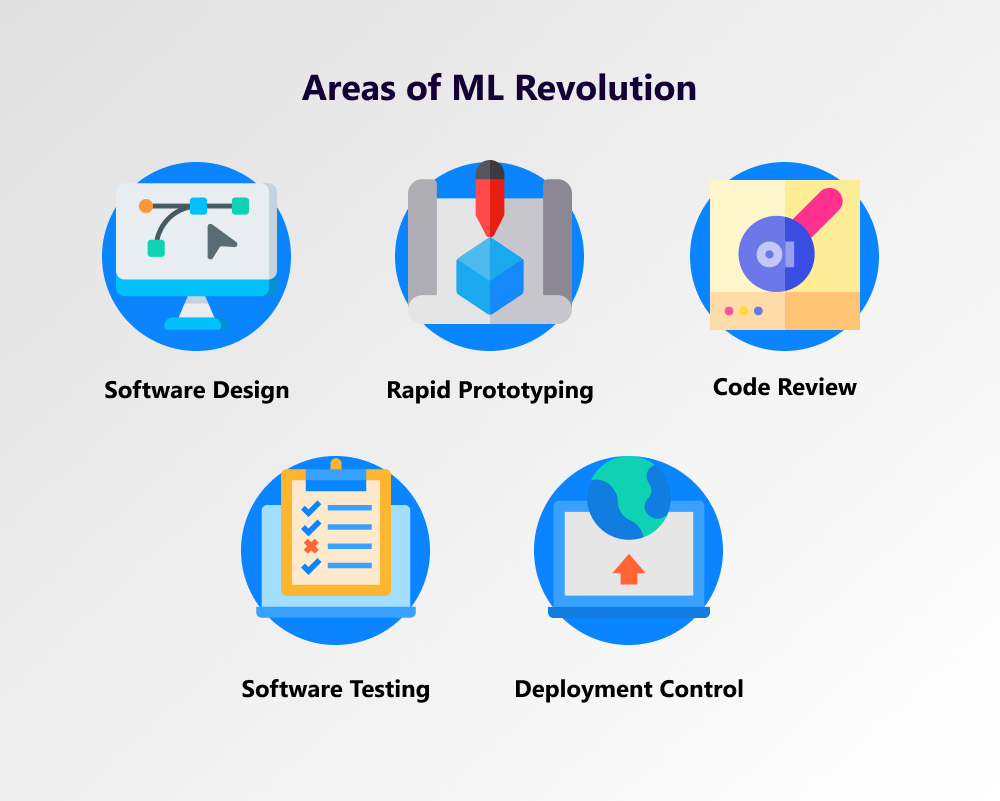The terms Machine Learning and Artificial Intelligence were first mentioned in the 1950s. However, engineers of those times could hardly imagine that the tools and technology facilitating engineering work could do exactly what they can do now. Our today’s article describes how intelligent machines capable of replicating the human brain affect the world of engineering, demonstrating to us their powerful nature which turned out to be even more impressive than scientists once expected.
written by:
Anastasia Borodinets
The terms Machine Learning and Artificial Intelligence were first mentioned in the 1950s. However, engineers of those times could hardly imagine that the tools and technology facilitating engineering work could do exactly what they can do now. Our today’s article describes how intelligent machines capable of replicating the human brain affect the world of engineering, demonstrating to us their powerful nature which turned out to be even more impressive than scientists once expected.
The Role of AI/ML in Engineering: Destroyer or Creator?
Like anything new, the emergence of Machine Learning and Artificial Intelligence was surrounded by hype. At the same time, truly competent specialists have never seen fashionable technology as a panacea for almost all industries, although the benefits of implementing ML and AI can be really huge, especially when it comes to the field of engineering.
AI systems allow automating multiple low-level engineering tasks and can take on a significant portion of the supervisory side of engineering.
Yet to give an objective evaluation of the effect of AI technologies on engineering, let’s look at their dark side, namely the ability to kill jobs.
For example, Oxford Economics predicts that by 2030 up to 20 million manufacturing jobs worldwide will be displaced by advanced robotics. Furthermore, according to Oak Ridge National Laboratory researches by 2040 AI, machine learning, and natural language processing will change software engineering to the point that machines, instead of humans, will write most of the code.
It is easy to believe that due to the Fourth Industrial Revolution thousands of jobs will be lost – the previous three also destroyed many occupations of those days and required people to take on higher-skilled roles.
However, not all forecasts on the effects of Industry 4.0 on human resources are so pessimistic.
Gartner, for instance, states that in 2025 AI will create two million net-new jobs.
The World Economic Forum also believes that 4IR won't harm employment levels. The Swiss think tank predicts that by 2022 machines will generate 58 million more jobs than they displace.
Well, it’s hard to tell what predictions are destined to come true, let’s wait and see. One thing is clear – it is useless to resist progress. There’s no doubt that in the nearest future AI and ML will become an integral part of each industry, primarily engineering.
Now let’s go back from the future to reality and see how Artificial Intelligence is already affecting such a branch of engineering that deals with the design, development, implementation, and maintenance of computer programs, namely software engineering.
Role of AI/ML in Software Engineering
Here are some of the most common areas of software engineering being revolutionized by Machine Learning and AI.
#1| Software Design
Generally, creating a project design is not an easy task that should be solved only by a specialist who has the appropriate education and expertise. At the same time, settling on the right design for every stage can be a challenge even for great designers and take a lot of time, endless effort, and huge patience before the customer is satisfied.
This is exactly the case when automating some complex procedures using Artificial Intelligence tools to design the projects becomes a real lifesaver.
For instance, with AIDA (Artificial Intelligence Design Assistant) – a website building platform that learns each client unique tastes and uses this knowledge to build customized website style, focus, image, and more – designers can understand customer needs faster and improve the design process.
#2| Rapid Prototyping
Well, you have a great idea for a software product and naturally want to make it a reality. To do this, you will have to be patient, since creating a product prototype usually lasts for several weeks, or even months.
Yet, if Machine Learning tools come in, it takes times fewer resources to build a worthy prototype. That means now you can have your software prototype ready in a few days!
Besides, with Machine Learning fewer technical specialists are required to develop software.
#3| Code Review
A healthy and clean code can greatly improve the operational efficiency of any organization. Given that sooner or later each company embraces digital transformation that requires implementing new technologies as well as evolving the existing ones, code refactoring becomes imminent.
Machine Learning technologies can significantly simplify the process, allowing for automatic reviewing of the code.
Compilers (special programs that process and convert computer code written in a particular programming language into a machine language or instructions that can be read by a computer) can fix old code quickly and easily. It would take human developer months to complete such a task, whereas compilers do it in a few days only.
#4| Software Testing
Testing is a crucial phase in software development, which sometimes is too expensive to afford for some companies. Any changes made to the code require further testing, taking up developers’ time, and therefore customers’ money.
That’s when AI-powered tools come to the rescue once again.
For instance, Functionize – intelligent testing platform, which uses deep-learning ML models and other AI-powered technologies for functional testing for mobile and web apps, which helps reduce the time required to manage test infrastructures.
Another great software testing tool Appvance IQ uses AI to create test cases based on user behavior, as well as to execute performance and load tests easily.
Speaking of popular AI-driven tools for test automation we cannot but mention Testim that deploys Machine Learning to allow developers to establish and maintain effective automation using both coded and codeless techniques.
Today there are numerous platforms and tools, that incorporate AI and Machine Learning technologies to facilitate the painstaking software testing process. Testing is a fertile soil to implement AI and below you can see exactly why.
- AI/ML makes it easier to handle vast amounts of data
The traditional test scenario implies tester needs to make sure all existing problems have been solved during testing. The challenge is that to do this, a huge amount of data must be processed, moreover – within a limited period. Resolving the issue with AI and Machine Learning, a programmer can remove the burden focusing on tasks that require human intelligence and discernment.
- AI/ML eliminates the potential for human error
Testing always involves collecting and analyzing data. Unfortunately, the lack of time often leads to overlooked bugs in the software. Machine Learning helps avoid awkward situations when users pick up on system errors faster than developers. By using Machine Learning for automation testing engineers can get far more accurate results than with traditional manual software testing. Also, along with reducing the probability of human errors, the team can increase the amount of test data without any extra workload on testers.
- AI/ML enable continuous testing
As humans, QA testers can’t work for 24 hours without any break, which can’t be said about test automation systems. Advanced, highly sophisticated ML-based testing systems can ensure continuous testing checking 24/7 how the product works in different conditions.
- AI/ML allow for consistent testing
Imagine such a situation: you have tested the same product twice. Are you sure, you conducted both tests identically? Not really? Unfortunately, inconsistency is common to most people. However, with ML technology you can repeat the same tests an infinite number of times, reliably.
- AI/ML give more accuracy to detect discrepancies
Naturally, human eyes can’t always notice all and any user interface anomalies. Is this UI element positioned correctly? Should it be exactly this color? Sure thing, some visual errors are easy to spot, but refined ML-based validation tools can detect even the slightest imperfections.
#5| Deployment Control
AI/ML fleet of tools enables developers to analyze the deployment process reducing the risk of failure while deploying.
Moreover, the deployment phase is a stage of software development where developers often have to update applications or programs to the latest versions.
With Machine Learning algorithms, Artificial Intelligence minimizes any vulnerabilities during the upgrade.
Bottom Line
Today Artificial Intelligence and evolutionary algorithms in engineering systems are perceived not as something extraordinary, but rather as a norm. Given the potential benefits that Artificial Intelligence may offer, ignoring the AI branch in engineering seems totally non-pragmatic.
Even though the implementation of the innovation can adversely affect human resources, the demand for AI and Machine Learning in the engineering-related fields (in software engineering particularly), is not going to decrease in the future.
Undoubtedly, in the next few years, AI-assisted software development is to gain even more popularity since hundreds of professionals around the globe are already using Artificial Intelligence in design, prototyping, code review, testing, and deployment.
So, when all the evidence indicates that AI and Machine Learning prove to be game-changers in engineering, what else keeps you from adopting this new technology?
If you are one of those companies that are not afraid of innovation and are ready to have AI/ML as a part of your systems but do not know where to start, Qulix Systems would be happy to advise you!
Hire our technical experts to build even the most challenging AI/ML projects on time and within your budget.
Connect with Qulix Systems’s Support Team to discuss how we can help your business transition to productive and efficient AI/ML technologies.

Contacts
Feel free to get in touch with us! Use this contact form for an ASAP response.
Call us at +44 151 528 8015
E-mail us at request@qulix.com











